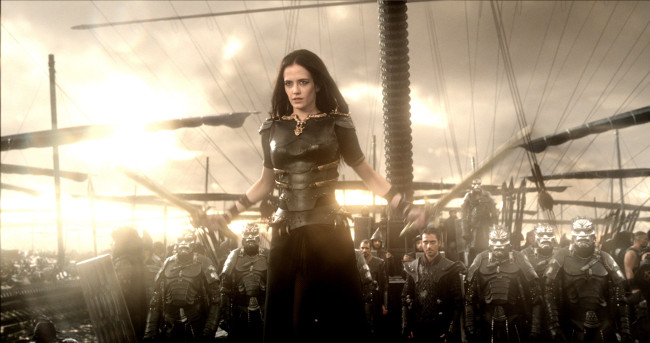By Mikhail Karadimov March 18th, 2014
300: Rise of an Empire
dir. by Noam Murro
The only thing I can say with full certainty about 300: Rise of an Empire is that Hollywood’s chain of Gold’s Gyms must’ve enjoyed a sudden and serious spike in membership registration due to this flick. Lot of beefy men with beefy abs strutting their stuff and flexing their muscles on screen. I wonder how many crunches the film’s director, Noam Murro, made his actors do in between takes. There must’ve been a requirement.
If you’ve seen the first 300 movie—a bloody, humorless mess of slow-motion carnage—then you know what to expect with this one: angry men roam about the lands—in this case, seas—looking for people to slice in half. Empires threaten each other because—well, because papa Xerxes was speared through the gut by some scantly-clad man with, like, a billion abs, and so Xerxes (Rodrigo Santoro), as an act of retribution, journeys out to some golden pool of rejuvenation to drain himself free of all good and replace it with a heavy dose of evil and androgynous flair, all of which is meant to amplify his testosterone levels to a thousand and rouse his loins for blood-letting mayhem. Battles are waged on land, on sea, in boudoirs as people are chopped up, minced up, and served for our viewing hunger. The blood is thicker, redder, and all the more cartoonish for it.
The performances clunk about like wooden figurines—full of sound and fury, signifying a whole lot of nothing. I never thought an actor would seriously consider ceaseless yelling as the sole conveyance of war and gravitas. The performances are so stilted that there’s a moment in the film when it flashes back to a shot of Gerard Butler as Leonidas—a close up of a small, sideways smile, a nod of his head, and a mix of confidence and inherent human weakness—that I realized: man…I really miss Gerard Butler. The man has some serious chops, especially when juxtaposed to this cavalcade of lunkheads.
Like the first film, the battle sequences hammer on too long, and the dialogue scenes slog insipidly slow. The characters never discuss anything of value other than honor and fear. Every so often, the Grecian men shrink with fear only to be bolstered by the obligatory guttural-grunted speeches of an actor lacking conviction (but no worries, he has a super-inflatable diaphragm to compensate)—words about fear and overcoming fear and how fear blah, blah, blahs. They battle, recuperate, speechify, and die. The movie cycles through the motions, punctuating each cycle with a mound of heads and limbs. The film eventually perks up with one of its more unusual and legitimately visceral scenes when Artemisia (Eva Green), a spurned Grecian warrior seeking to destroy all of Greece for raping and killing her family, wages a kinky battle of sex against Themistocles (a lifeless Sullivan Stapleton) on her commander’s ship; a la the supernatural bang-around actress Eva Green shared with Johnny Depp in Dark Shadows. Green (Casino Royale, Dark Shadows) plays Artemisia with devious relish. Green excels at imbuing her films with a sexually-charged sense of carnage that only a Frenchie like her could pull off. Consequently, she has the bad fortune of always being the sole source of excellence in what are often considered terrible movies. She needs to have a serious sit-down with her agent and talk about setting the bar a little higher.
The film isn’t nearly as good as its predecessor, which at least had the wherewithal to break up its monotony of violence with strange little details like the hunchback; Leonidas’s stripper oracle; Xerxes’s opium-smoking, donkey-headed crony. Zack Snyder’s outing—as mind-numbingly boring as it was—at least went for it—whatever it may be—with reckless abandon. This sequel, however, plays declawed. Full of gushy, red blood and swinging sharp instruments, it’s a film that’s ultimately weakened by that Hollywood necessity to recreate success without fully understanding what it was that was so successful to begin with.
Oh Zack Snyder! It looks like we needed you after all…. What a shame. Never thought I’d lament the man’s absence.







